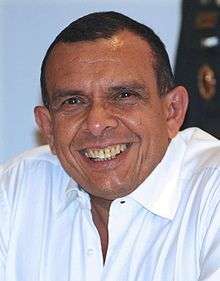Porfirio Lobo Sosa
Porfirio Lobo Sosa (born 22 December 1947), known as Pepe Lobo, is a Honduran politician and agricultural landowner who served as President of Honduras from 2010 to 2014.[1] A member of the conservative National Party and a former deputy in the National Congress of Honduras from 1990, he was president of the National Congress of Honduras from 2002 to 2006. He came second to Manuel Zelaya with 46% of the vote in the 2005 general election. After the military ousted Zelaya in a coup d'état, Lobo was elected president in the 2009 presidential election and took office on 27 January 2010.[2]
Porfirio Lobo Sosa | |
|---|---|
 | |
| 54th President of Honduras | |
| In office 27 January 2010 – 27 January 2014 | |
| Vice President | María Antonieta de Bográn (2010-2014) |
| Preceded by | Roberto Micheletti (Acting) |
| Succeeded by | Juan Orlando Hernández |
| President of the National Congress | |
| In office 25 January 2002 – 25 January 2006 | |
| Preceded by | Rafael Pineda Ponce |
| Succeeded by | Manuel Zelaya Rosales |
| Deputy of the Olancho Department | |
| In office 25 January 1990 – 25 January 2006 | |
| Personal details | |
| Born | 22 December 1947 Trujillo, Honduras |
| Political party | National Party |
| Spouse(s) | Rosa Elena |
| Alma mater | University of Miami Patrice Lumumba University |
Family and early career
Lobo was born in Trujillo and grew up on the ranch of La Empalizada near Juticalpa, Olancho.[3] His parents are Porfirio José Lobo López and Rosa Sosa Hernández de Lobo, both deceased. His father served as deputy in the National Congress in 1957 and was a well-known political leader in the department of Olancho. His brother Ramón Rosa Lobo Sosa is a deputy in the National Congress for the department of Colón.
After attending a Catholic school in Juticalpa, he furthered his studies at the San Francisco Institute of Tegucigalpa and then at the University of Miami in the United States. After obtaining his bachelor's degree in business administration from the University of Miami, he returned to Honduras to work in the family's agricultural business, and to teach political economy and English at the La Fraternidad Institute in Juticalpa for 11 years. He was granted a doctorate by Patrice Lumumba University in Moscow, Russia. He also holds a black belt in taekwondo.
Political career
Lobo's political career started at the age of 19 as a political leader in Olancho. For 31 years, he presided over the national party's youth in Olancho, local committee of Juticalpa and the departmental committee of Olancho.
He was in charge of the Honduran corporation for forestry development, from 1990 to 1994. He was elected to the national congress in 1990, where he later served as president, from 2002 to 2006.
2005 general election
Lobo was the National Party of Honduras' candidate for 27 November 2005 presidential election; Mario Canahuati was his running mate. His campaign was based on job security, a tough stance on crime, and being in favour of reintroducing the death penalty.[4] He came in second in the presidential election with 46.17% of the vote against 49.90% from his rival Manuel Zelaya of the Liberal Party of Honduras. He held the position of president of the National Party of Honduras.
2009 constitutional crisis and general election
| Wikinews has related news: |
In December 2008, he once again became the presidential candidate of the PNH and on 29 November 2009 he was elected President of Honduras with 56% of the vote against 38% for his rival Elvin Santos.[1]
Following his victory, Lobo said his administration will "begin the great national dialogue".[5] He also promised to encourage private investment to generate employment and to increase social benefits in a country where 70% of its 7 million citizens live in poverty.
Presidency (2010-2014)
Human Rights Watch argued that "at least eight journalists and ten members of the National Popular Resistance Front (FNRP)—a political group that opposed the 2009 removal from office of the then president and advocated the reinstatement of the ousted president, Manuel Zelaya — have been killed since Lobo assumed power on January 27, 2010".[6] Human Rights Watch has also reported attacks on the independence of the judiciary and public prosecutors. The Obama administration, however, praised Lobo for his attempts at reconciliation, which include forming a truth commission to investigate events surrounding the removal from office as well as appointing a human rights adviser and political opponents to his government.[7]
References
- Rory Carroll in Tegucigalpa (30 November 2009). "Honduras elects Porfirio Lobo as new president". London: Guardian. Retrieved 19 October 2010.
- RedacciĂłn (27 January 2010). "Son cuatro años. Ni un día más, ni un día menos" (in Spanish). ElHeraldo.hn. Retrieved 19 October 2010.
- Porfirio Lobo Sosa Author, Roberto Ortiz de Zárate, published 6 June 2011
- "En Honduras, candidato gana abogando por pena de muerte". Emol.com. Retrieved 19 October 2010.
- "Lobo Wins Honduran Presidency After Peaceful Vote". Bloomberg. 30 November 2009.
- Human Rights Watch, 29 July 2010, Honduras: Ongoing Attacks Foster Climate of Intimidation
- Malkin, Elisabeth. The New York Times http://topics.nytimes.com/top/reference/timestopics/people/l/porfirio_lobo_sosa/index.html. Missing or empty
|title=(help)
External links
- Biography by CIDOB Foundation (in Spanish)
| Political offices | ||
|---|---|---|
| Preceded by Rafael Pineda Ponce |
President of the National Congress 2002–2006 |
Succeeded by Roberto Micheletti |
| Preceded by Roberto Micheletti Acting |
President of Honduras 2010–2014 |
Succeeded by Juan Orlando Hernández |